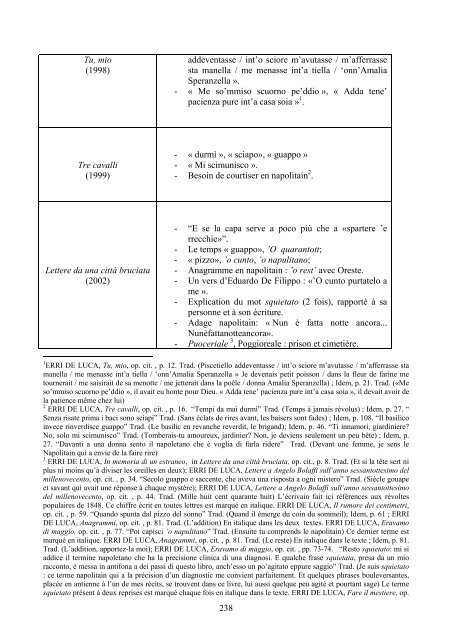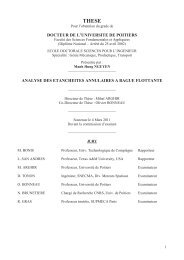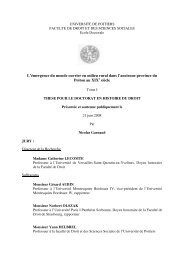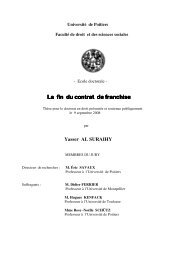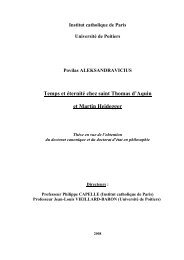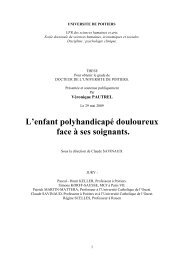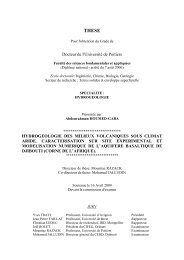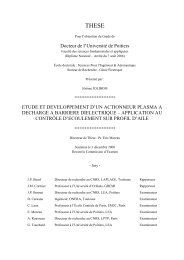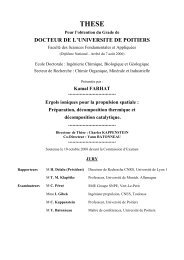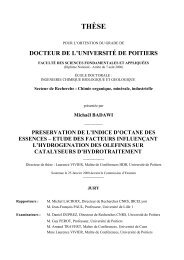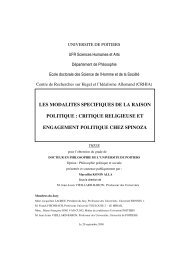Consulter le texte intégral de la thèse - Université de Poitiers
Consulter le texte intégral de la thèse - Université de Poitiers
Consulter le texte intégral de la thèse - Université de Poitiers
Create successful ePaper yourself
Turn your PDF publications into a flip-book with our unique Google optimized e-Paper software.
Tu, mio<br />
(1998)<br />
Tre cavalli<br />
(1999)<br />
Lettere da una città bruciata<br />
(2002)<br />
ad<strong>de</strong>ventasse / int’o sciore m’avutasse / m’afferrasse<br />
sta manel<strong>la</strong> / me menasse int’a tiel<strong>la</strong> / ‘onn’Amalia<br />
Speranzel<strong>la</strong> ».<br />
- « Me so’mmiso scuorno pe’ddio », « Adda tene’<br />
pacienza pure int’a casa soia » 1 .<br />
- « durmì », « sciapo», « guappo »<br />
- « Mi scimunisco ».<br />
- Besoin <strong>de</strong> courtiser en napolitain 2 .<br />
- “E se <strong>la</strong> capa serve a poco più che a «spartere ’e<br />
rrecchie»”.<br />
- Le temps « guappo», ’O quarantott;<br />
- « pizzo», ’o cunto, ’o napulitano;<br />
- Anagramme en napolitain : ’o rest’ avec Oreste.<br />
- Un vers d’Eduardo De Filippo : «’O cunto purtatelo a<br />
me ».<br />
- Explication du mot squietato (2 fois), rapporté à sa<br />
personne et à son écriture.<br />
- Adage napolitain: « Nun è fatta notte ancora...<br />
Nunèfattanotteancora».<br />
- Puoceria<strong>le</strong> 3 , Poggiorea<strong>le</strong> : prison et cimetière.<br />
1 ERRI DE LUCA, Tu, mio, op. cit. , p. 12. Trad. (Piscetiello ad<strong>de</strong>ventasse / int’o sciore m’avutasse / m’afferrasse sta<br />
manel<strong>la</strong> / me menasse int’a tiel<strong>la</strong> / ‘onn’Amalia Speranzel<strong>la</strong> » Je <strong>de</strong>venais petit poisson / dans <strong>la</strong> f<strong>le</strong>ur <strong>de</strong> farine me<br />
tournerait / me saisirait <strong>de</strong> sa menotte / me jetterait dans <strong>la</strong> poê<strong>le</strong> / donna Amalia Speranzel<strong>la</strong>) ; I<strong>de</strong>m, p. 21. Trad. («Me<br />
so’mmiso scuorno pe’ddio », il avait eu honte pour Dieu. « Adda tene’ pacienza pure int’a casa soia », il <strong>de</strong>vait avoir <strong>de</strong><br />
<strong>la</strong> patience même chez lui)<br />
2 ERRI DE LUCA, Tre cavalli, op. cit. , p. 16. “Tempi da mai durmì” Trad. (Temps à jamais révolus) ; I<strong>de</strong>m, p. 27. “<br />
Senza risate prima i baci sono sciapi” Trad. (Sans éc<strong>la</strong>ts <strong>de</strong> rires avant, <strong>le</strong>s baisers sont fa<strong>de</strong>s) ; I<strong>de</strong>m, p. 108. “Il basilico<br />
invece rinverdisce guappo” Trad. (Le basilic en revanche reverdit, <strong>le</strong> brigand); I<strong>de</strong>m, p. 46. “Ti innamori, giardiniere?<br />
No, solo mi scimunisco” Trad. (Tomberais-tu amoureux, jardinier? Non, je <strong>de</strong>viens seu<strong>le</strong>ment un peu bête) ; I<strong>de</strong>m, p.<br />
27. “Davanti a una donna sento il napo<strong>le</strong>tano che è voglia di far<strong>la</strong> ri<strong>de</strong>re” Trad. (Devant une femme, je sens <strong>le</strong><br />
Napolitain qui a envie <strong>de</strong> <strong>la</strong> faire rire)<br />
3 ERRI DE LUCA, In memoria di un estraneo, in Lettere da una città bruciata, op. cit., p. 8. Trad. (Et si <strong>la</strong> tête sert ni<br />
plus ni moins qu’à diviser <strong>le</strong>s oreil<strong>le</strong>s en <strong>de</strong>ux); ERRI DE LUCA, Lettere a Angelo Bo<strong>la</strong>ffi sull’anno sessantottesimo <strong>de</strong>l<br />
mil<strong>le</strong>novecento, op. cit. , p. 34. “Secolo guappo e saccente, che aveva una risposta a ogni mistero” Trad. (Sièc<strong>le</strong> gouape<br />
et savant qui avait une réponse à chaque mystère); ERRI DE LUCA, Lettere a Angelo Bo<strong>la</strong>ffi sull’anno sessantottesimo<br />
<strong>de</strong>l mil<strong>le</strong>novecento, op. cit. , p. 44. Trad. (Mil<strong>le</strong> huit cent quarante huit) L’écrivain fait ici références aux révoltes<br />
popu<strong>la</strong>ires <strong>de</strong> 1848. Ce chiffre écrit en toutes <strong>le</strong>ttres est marqué en italique. ERRI DE LUCA, Il rumore <strong>de</strong>i centimetri,<br />
op. cit. , p. 59. “Quando spunta dal pizzo <strong>de</strong>l sonno” Trad. (Quand il émerge du coin du sommeil); I<strong>de</strong>m, p. 61 ; ERRI<br />
DE LUCA, Anagrammi, op. cit. , p. 81. Trad. (L’addition) En italique dans <strong>le</strong>s <strong>de</strong>ux <strong>texte</strong>s. ERRI DE LUCA, Eravamo<br />
di maggio, op. cit. , p. 77. “Poi capisci ’o napulitano” Trad. (Ensuite tu comprends <strong>le</strong> napolitain) Ce <strong>de</strong>rnier terme est<br />
marqué en italique. ERRI DE LUCA, Anagrammi, op. cit. , p. 81. Trad. (Le reste) En italique dans <strong>le</strong> <strong>texte</strong> ; I<strong>de</strong>m, p. 81.<br />
Trad. (L’addition, apportez-<strong>la</strong> moi); ERRI DE LUCA, Eravamo di maggio, op. cit. , pp. 73-74. “Resto squietato: mi si<br />
addice il termine napo<strong>le</strong>tano che ha <strong>la</strong> precisione clinica di una diagnosi. E qualche frase squietata, presa da un mio<br />
racconto, è messa in antifona a <strong>de</strong>i passi di questo libro, anch’esso un po’agitato eppure saggio” Trad. (Je suis squietato<br />
: ce terme napolitain qui a <strong>la</strong> précision d’un diagnostic me convient parfaitement. Et quelques phrases bou<strong>le</strong>versantes,<br />
p<strong>la</strong>cée en antienne à l’un <strong>de</strong> mes récits, se trouvent dans ce livre, lui aussi quelque peu agité et pourtant sage) Le terme<br />
squietato présent à <strong>de</strong>ux reprises est marqué chaque fois en italique dans <strong>le</strong> <strong>texte</strong>. ERRI DE LUCA, Fare il mestiere, op.<br />
238


